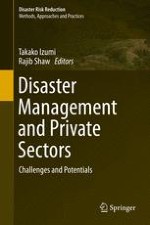2015 | OriginalPaper | Buchkapitel
18. Experience of Nepal: Implication to Risk Reduction
verfasst von : Man B. Thapa, Naresh Giri, Manish Basnyat
Erschienen in: Disaster Management and Private Sectors
Verlag: Springer Japan
Aktivieren Sie unsere intelligente Suche, um passende Fachinhalte oder Patente zu finden.
Wählen Sie Textabschnitte aus um mit Künstlicher Intelligenz passenden Patente zu finden. powered by
Markieren Sie Textabschnitte, um KI-gestützt weitere passende Inhalte zu finden. powered by
